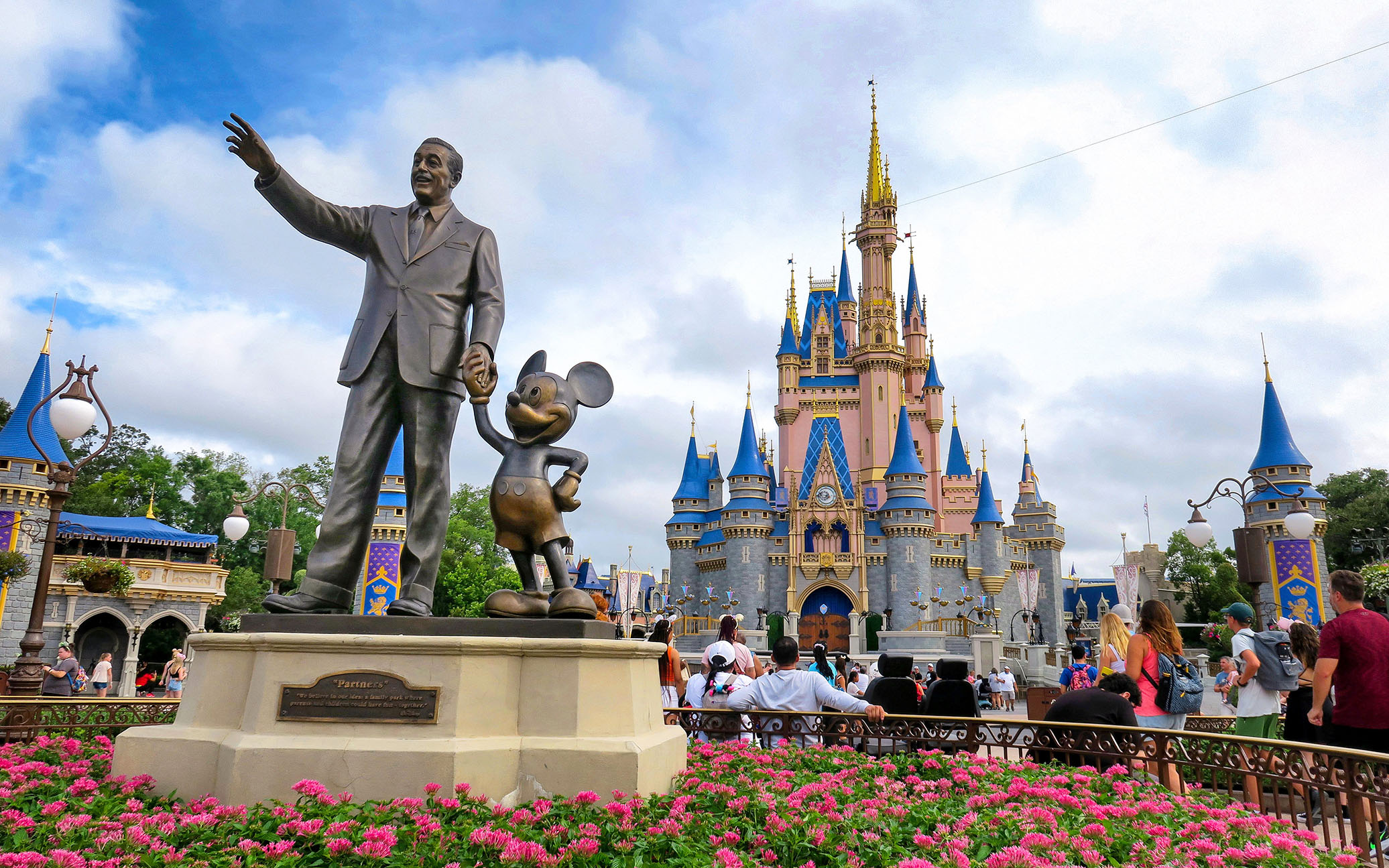The “Partners” statue of Walt Disney and Mickey Mouse at Cinderella Castle in the Magic Kingdom at Walt Disney World in Lake Buena Vista, Fla. The statue was created by legendary Disney sculptor Blaine Gibson in 1993. (Joe Burbank/Orlando Sentinel/TNS)
Disney is overhauling its disability access policies after a surge in abuse of programs meant to accommodate guests with autism and other developmental disabilities.
The company said it will soon be implementing new procedures at both Disneyland Resort and Walt Disney World Resort to ensure people with disabilities receive accommodations that best suit their needs.
The update comes as Disney announced that its Disability Access Services (DAS) program has become the most widely requested service at its theme parks, tripling in usage in the past five years alone.
ADVERTISEMENT – CONTINUE READING BELOW
Disability Access Services allows visitors with disabilities to request re-entry times for one attraction at a time to avoid having to physically wait in line. According to Disney, the program, introduced in 2013 to curb abuse of the previous system, is aimed at people “who are unable to wait in traditional lines for long periods of time due to developmental disabilities, such as autism.”
But the company now says usage of its disability access services is far higher than expected, resulting in longer wait times for people with legitimate needs, and that authorities are introducing new measures to curb the situation.
Disney is investing in additional Cast Members and specialized training to help people with disabilities understand and identify assistance based on their needs. Additionally, the company has partnered with Inspire Health Alliance to provide certified medical professionals trained in psychology or behavioral health to help Disney Cast Members determine whether they qualify for the Disability Access Services program. Eligibility is determined based on an individual conversation centered around questions about an individual’s needs.
Disney said guests who do not qualify for the Disability Access Services program may be advised to use other amenities, such as line-back options for people who need to use restrooms frequently or wheelchair access and return times to locations for people who use mobility devices.
To get approved for the Disability Access Services Program under the updated approach, we encourage you to use Disney’s virtual video chat system to discuss your needs with a member of the Accessibility Team before you arrive at Disneyland or Disney World. Or, you can have this conversation in person by visiting a designated window located on the walkway between the main entrances at Disneyland. At Disney World, guests can have a virtual chat on-site.
Disney is extending the validity period for enrollment in the Disability Access Services program from 60 to 120 days. At the same time, the program will be limited to the immediate family or up to four family members of the person who qualifies for Disability Access Services.
“If any of the statements made by a guest during the DAS acquisition process are determined to be untrue, the guest will be permanently banned from admission to Walt Disney World Resort and Disneyland Resort, and any previously purchased Annual Passes, Magic Key Passes, tickets and other park products and services will be confiscated with no refunds,” Disney said on its website.
The new policy will go into effect at Disney World on May 20th and at Disneyland on June 18th.
Disney isn’t the only theme park company to have recently changed its policies regarding disability access.
Last year, Universal Studios began requiring visitors seeking disability accommodations to apply for a personal accessibility card before visiting its Florida and California parks. To receive the card, issued by the International Board of Certification and Continuing Education Standards (IBCCES), people with disabilities must submit a photo and documentation from a health care provider, government agency or education professional detailing the type of accommodation they want.
Disney officials said they considered partnering with several third parties for the access cards but abandoned those options because many of them required visitors to plan ahead and submit records and paperwork.
“Disney is committed to providing incredible experiences for all of our guests, including guests with disabilities, which is why we’re committed to offering a wide range of innovative support services to help guests with disabilities have a great time during their visit to our theme parks,” a Disney spokesperson said.
Read more stories like this: Sign up for Disability Scoop’s free email newsletter to receive the latest developmental disability news straight to your inbox.

